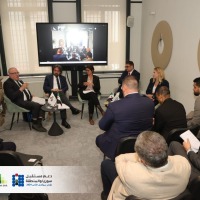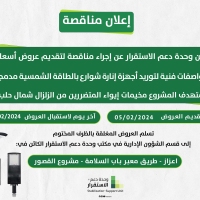History of the workshops:
Workshop with the Female Journalists: 03 June 2020
Workshop with the male and female journalists: 11 June 2020
Workshop with the male-female journalists, Civil Society Organization and Local Authorities: 24 June 2020
Number of attendees: 100 individuals (male and female workers in the media and press fields – the media unions – the media union of Aleppo and its countryside – Azaz Local Council – Civil Society Organizations – the Bar Association)
Within the scope of a project launched by the Stability Support Unit in five regions inside Syria under the name of ‘’Freedom of the media and the protection of journalists’’, the unit holds a package of (3) workshops and meetings in each region (Azaz – Afrin -Al-Bab-Marea-Jarablus); 1) the first workshop is with attendance of women journalists, 2) the second is with attendance of women and men journalists, and 3) the third is with attendance of women – men journalists, the local authorities and Civil Society Organization.

The first region: Azaz
Workshop with Attendance of Women Journalists
The points that were discussed and emphasized:
Women journalists talked about the reality of women in the media and journalism field. Since the beginning of the revolution, women journalists’ role has been shown through covering demonstrations, conveying facts – incidents, and even in contributing to the establishment of media bodies. Women journalists also had a prominent role in journalistic writing and preparing short films, some women media workers even won international awards, but the reality imposed on the woman media works to be cautious about the sensitivity of this field at the level of society and the authorities, the thing that which sometimes forced the women media workers to use the pseudonyms and conceal their true identity.
Women

Women journalists talked a difficulty which is the society’s unacceptance of her work in the media field, underestimating her and bullying her whether on the street or through social media only because she is a woman, which forces her to work behind the scenes and makes it difficult for her to work alone in the public places .
Female journalists also focused on the lack of tools to facilitate their work compared to men media professionals and that some media institutions impose a style and scope of media work on them. The female media workers also indicated the difficulty to get approval/permission from the local authorities and the restrictions that limit the freedom of work, besides fear of threats (personal – family – defamation) and the absence of laws that protect and preserve their rights in media work.
Workshop with the attendance of women and men journalists
The points that were discussed and emphasized:
In this workshop, women, and men media professionals focused on the reality of the media in the past nine years, as workers in the media and journalism field they suffered from difficult circumstances mainly the lack and weakness of capabilities and tools to cover and transmit the events.
It was also pointed out that there is no effective body that represents them at the media level and addresses/communicates the local and external parties, this led to the dispersal of media discourse and the frequent disputes between media professionals inside Syria and abroad.

Despite all the above, the media professionals had an important role in spotting the light on the revolution and its stages, conveying the suffering of citizens and their living conditions, and producing many short films that won several awards and Oscars. The media professionals also tried to unify themselves by establishing local media bodies with the available capacities, experiences, and capabilities, but those bodies did not have that significant role in organizing the work of media professionals.
Other points discussed in this workshop:
Increase in the number of workers in the media field inside Syria and the absence of mechanisms regulating their work and development.
Bullying and the restrictions that the media professionals are exposed to, especially the women media professionals.
The effect of the military and the factions, and the restrictions they impose on the work of media professionals
Many regional media outlets are supporting/advocating competing political trends and linking them to the Syrian reality which leads to challenges facing the media professionals
The society’s negative view of media work
Society’s Negative Perception of the Media work
The absence of the media reference/umbrella and the lack of advocacy for the issues that women media professionals are exposed to
The difficulty that the media professionals are facing regarding obtaining statements/permissions from local authorities in some regions

Workshop with attendance of women – men journalists, the local authorities, and civil society organization.
The points that were discussed and emphasized:
Where discussions took place about the protection journalists and media professionals, the ways to enable them to perform their works properly, and that this protection requires efforts to be exerted by all; the media professionals (independents and those who work to media bodies), local authorities/bodies and CSOs.
The importance of signing a memorandum of understanding with local authorities (local councils – factions) to guarantee the rights and protection of journalists, and also the importance of circulating that MoU, as circulating it makes the commitment to implement it a reality.
The importance of conducting meetings with local councils to work to include in their bylaws articles related to the media work, taking into account the specificity and nature of this work, and the need for coordination with the Bar Association.
The importance of the provision of facilities by the local councils to the media professionals regarding the access to the information and data transparently.
The importance of that the local authorities (military-civil) separate its media from the civil media because their media offices have an official or governmental status and work in line with the administrational regulations in them. As for independent media, it aims to shed light on general issues, discuss problems, find solutions to them, and support positive aspects.
It is also talked about the negligence of the media field by the CSOs and NGOs. The CSOs and NGOs focus on supporting projects concerned with child protection, building the capabilities of individuals in institutions as well as livelihoods and women empowerment projects. But now it became necessary that NGOs and CSOs focus on supporting the media fields through their projects.
The importance of holding seminars, workshops or training on issues such as transitional justice, governance, citizenship and other topics that help the media professionals understand the issues related to these topics and thus enable them to address them more effectively and professionally due the importance of the role of the media professionals in addressing these issues within the current and future stage.
The importance of provision of advices to the media professionals by the unions and specialized organizations.
The importance of working on conducting trainings such as conflict management trainings for the media professionals, media project management trainings, and more specialized media trainings, such as investigative journalism training.
The importance of working on conducting trainings such as conflict management trainings for the media professionals, media project management training, and more specialized media training, such as investigative journalism training.
The need to hold workshops between media professionals (as bodies) and the Bar Association was emphasized to propose laws that would protect journalists and media workers and work to develop bylaws for the media bodies according to Syrian or international law.

Recommendations:
▪ Proposing measures drawn from international norms to guarantee protection of women and men journalists
▪ Developing bylaws for media bodies including provisions to ensure protection and respect of media professionals
▪ Activating the complaints policies/mechanisms within the media bodies
▪ Advocating the men and women media workers by the media bodies, especially in the event of bullying.
▪ The importance of existence of a compressive platform that includes the women workers in the media and journalism fields
▪ The necessity of allocating a quota for women media workers in the media bodies
▪ The importance of presence of professional monitoring by the media organizations on the materials that are being published to ensure the adherence to international professional standards, the code of conducts, and labor laws
▪ The importance of not to interfering in the work of journalists or influence their contents and the need to separate the military media from the civil media in order to prevent media chaos
▪ Stop stereotyping the role of women media professionals
▪ Work to unify the media references/ authorities
▪ To adopt the media bodies as reference sources by the institutions and organizations while recruiting media workers
▪ Provision of facilities to the media professionals to get the required permissions and statements to ensure their free access to information and reporting
▪ To map the relationship between media bodies and local authorities and institutions through memorandums of understanding that guarantee the rights and duties of the parties
▪ Developing the work of media professionals through series of courses and workshops that cover the media needs through the parties specialized in media work
▪ Advocating the journalists and defending their rights by civil society organizations and media bodies.
▪ The importance of holding training workshops for the media professionals on topics such as (citizenship – transitional justice – governance – conflict management) in order to increase their awareness and education.
▪ The importance of focusing on journalistic work and supporting the media initiatives such as magazines (for instance Our News (اخبارنا) magazine that is being issued by the Women Support and Empowerment Unit.
▪ Adherence to international professional standards, the code of conducts and labor laws
▪ Increase the coordination between media bodies and media institutes/faculties at the universities in order to support the academic media
▪ The importance of adherence to reporting of the news objectively and honestly and to ensure its authenticity
▪ To create a code of conduct to be approved by all parties and stakeholders
▪ Forming a committee that includes representatives of media bodies, CSOs and local authorities, with the task of following up and implementing these recommendations


